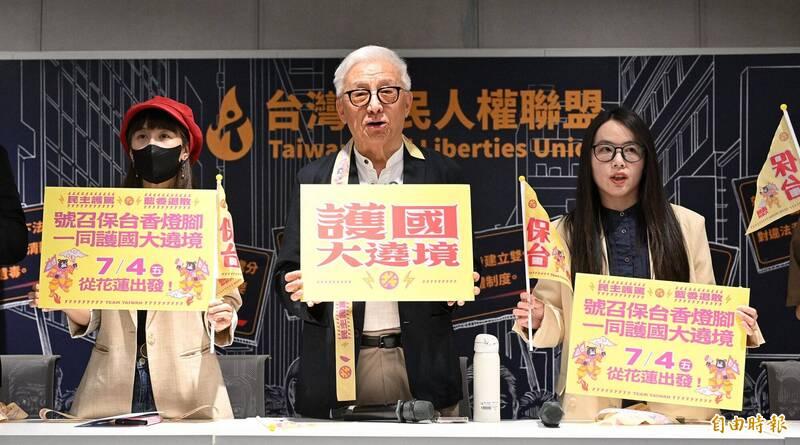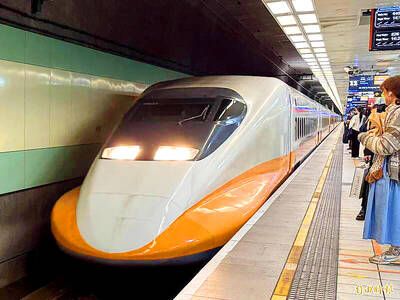Tech billionaire Robert Tsao (曹興誠), one of the initiators of recall campaigns targeting Chinese Nationalist Party (KMT) lawmakers, today announced a 16-day “national pilgrimage” tour as part of the lead-up to recall voting day.
Twenty-four KMT lawmakers and Hsinchu Mayor Ann Kao (高虹安) are facing recall votes on July 26. The Central Election Commission is still reviewing recall bids against seven lawmakers.
The KMT is working with the Chinese Communist Party (CCP) to undermine Taiwan’s values, said Tsao, who led the recall campaign against KMT Legislator Hsu Chiao-hsin (徐巧芯).

Photo: Chiang Chia-ming, Taipei Times
Taiwan must use this recall as a chance to say “no” and oppose unification, the United Microelectronics Corp founder told a news conference.
The results of the votes would be consequential for Taiwan's democracy, Tsao said, adding that if the KMT's lawmakers are not ousted, they would return to the legislature "reinvigorated."
The pilgrimage is scheduled to start on Friday next week in Hualien and representatives from 31 recall campaign groups from across the country would be joining it. It would head south toward Taitung before circling Taiwan clockwise.
The pilgrimage would end on July 19 at Qingdao E Road in Taipei, the site of last year’s “Bluebird movement” protests against bills proposed by the KMT and the Taiwan People’s Party.
Asked yesterday about the recall movement being framed around communism and defending Taiwan, China's Taiwan Affairs Office spokeswoman Zhu Fenglian (朱鳳蓮) said that people in Taiwan should oppose political manipulation by the Democratic Progressive Party (DPP).
DPP legislative caucus secretary-general Rosalia Wu (吳思瑤) today said the recalls are not China’s concern and that Taiwan's democracy does not need its input.
DPP spokeswoman Han Ying (韓瑩) said the party hopes that the pro-Taiwan, anti-communist stance will reinforce national unity, adding that President William Lai's (賴清德) series of 10 speeches emphasize Taiwan’s democratic values.
Meanwhile, the KMT is planning a large-scale rally on July 25 on Ketagalan Boulevard in Taipei, with supporting activities throughout the weeks leading up to the recall vote, sources within the party said.
The activities include anti-recall rallies in Taipei on July 5, rallies in New Taipei City and Taichung on July 19, and in Taoyuan on July 20, among other events, the sources said.
KMT Chairman Eric Chu (朱立倫) called the series of events a “golden week” that would feature appearances by major figures within the KMT, including Legislative Speaker Han Kuo-yu (韓國瑜), former Broadcasting Corp of China chairman Jaw Shaw-kong (趙少康) and KMT mayors.
Separately, the Taipei District Court yesterday ruled that two people be detained for two months without visitation rights in connection with suspected forgeries in the recall campaign targeting DPP New Taipei City Councilor Evalyn Chen (陳乃瑜).
Mou Wei-hui (繆維蕙), the director of KMT Legislator Lo Ming-tsai’s (羅明才) Sindian District (新店) office, and Liu Shih-chun (劉時郡), an aide, were ordered to be held and detained incommunicado, while Lin Tzu-ling (林姿伶), another aide, was released on NT$200,000 bail.
Additional reporting by Chang Wen-chuan

A 72-year-old man in Kaohsiung was sentenced to 40 days in jail after he was found having sex with a 67-year-old woman under a slide in a public park on Sunday afternoon. At 3pm on Sunday, a mother surnamed Liang (梁) was with her child at a neighborhood park when they found the man, surnamed Tsai (蔡), and woman, surnamed Huang (黃), underneath the slide. Liang took her child away from the scene, took photographs of the two and called the police, who arrived and arrested the couple. During questioning, Tsai told police that he had met Huang that day and offered to

LOOKING NORTH: The base would enhance the military’s awareness of activities in the Bashi Channel, which China Coast Guard ships have been frequenting, an expert said The Philippine Navy on Thursday last week inaugurated a forward operating base in the country’s northern most province of Batanes, which at 185km from Taiwan would be strategically important in a military conflict in the Taiwan Strait. The Philippine Daily Inquirer quoted Northern Luzon Command Commander Lieutenant General Fernyl Buca as saying that the base in Mahatao would bolster the country’s northern defenses and response capabilities. The base is also a response to the “irregular presence this month of armed” of China Coast Guard vessels frequenting the Bashi Channel in the Luzon Strait just south of Taiwan, the paper reported, citing a

BETTER SERVICE QUALITY: From Nov. 10, tickets with reserved seats would only be valid for the date, train and route specified on the ticket, THSRC said Starting on Nov. 10, high-speed rail passengers with reserved seats would be required to exchange their tickets to board an earlier train. Passengers with reserved seats on a specific train are currently allowed to board earlier trains on the same day and sit in non-reserved cars, but as this is happening increasingly often, and affecting quality of travel and ticket sales, Taiwan High-Speed Rail Corp (THSRC) announced that it would be canceling the policy on Nov. 10. It is one of several new measures launched by THSRC chairman Shih Che (史哲) to improve the quality of service, it said. The company also said

A total lunar eclipse, an astronomical event often referred to as a “blood moon,” would be visible to sky watchers in Taiwan starting just before midnight on Sunday night, the Taipei Astronomical Museum said. The phenomenon is also called “blood moon” due to the reddish-orange hue it takes on as the Earth passes directly between the sun and the moon, completely blocking direct sunlight from reaching the lunar surface. The only light is refracted by the Earth’s atmosphere, and its red wavelengths are bent toward the moon, illuminating it in a dramatic crimson light. Describing the event as the most important astronomical phenomenon